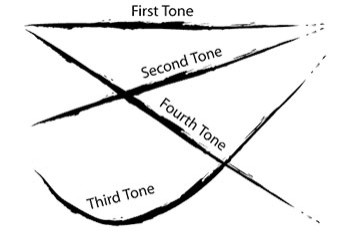5 most common mistakes when learning Chinese
Embarking on a new language is not too different from scaling a mountain. You start at the very bottom, looking up and the whole thing is towering above you. You cannot even see the top as it is covered in clouds and you are asking yourself what on earth was I thinking, can I really do this? And just like climbing mountains, learning languages is a lot about technique. You might know people who seem to pick up languages really easily and you wonder if you can do that too. With the right technique you can greatly improve your learning process, avoid common mistakes and reach the summit much faster (and with fewer “injuries”) than if you go about it freestyle.
We’ve asked four of our experienced teachers to give us some insights on what learning mistakes students tend to make so that you won’t have to repeat them. Below are the most common mistakes from Mandarin language learners as witnessed by our teachers, who have more than 15 years of teaching experience between them. Take their advice and you will find that learning Mandarin is more like a soft hill than a rocky mountain.
Mistake number 1 – Having the wrong mindset
You’ve decided to learn Chinese and you are slowly but steadily building your vocabulary. Only problem is, vocabulary in Chinese is not the same as in most other languages. Words are not constructed by letters, but by strokes and radicals, and often the meaning of a word is embedded in a long history rather than in a direct meaning. So you try to find the direct translation in your own language, after all that’s how we usually learn a new language, but you keep realizing that there is no direct translation. Our teachers say that many students are trying to learn Chinese by way of direct translating, when actually you need to use a different mindset when speaking Chinese compared to most other languages.
 Our teacher Bibi, who has taught Chinese for more than two years, says that “student use the wrong way of thinking. Most of student are still in their inherent mode of thinking to learn Chinese. You can see it very often, for example, some students try to translate every word in English, it is almost impossible. So in my opinion, student should change the way of thinking after they’ve decided learning Chinese, especially for those who come to china to learn, that is a very rare opportunity, because you can see how Chinese to use this word in this specific occasion. this is the best way to learn a language”.
Our teacher Bibi, who has taught Chinese for more than two years, says that “student use the wrong way of thinking. Most of student are still in their inherent mode of thinking to learn Chinese. You can see it very often, for example, some students try to translate every word in English, it is almost impossible. So in my opinion, student should change the way of thinking after they’ve decided learning Chinese, especially for those who come to china to learn, that is a very rare opportunity, because you can see how Chinese to use this word in this specific occasion. this is the best way to learn a language”.
Learning Chinese by the direct translation approach is also a sure way to discourage yourself, as you will constantly have disappointment when a word cannot be explained with a translated counterpart. You might feel that Chinese makes no sense or that it is too difficult, since your method is almost working against you. Xu Lei, our Education Coordinator, who has taught Chinese to foreigners for more than five years, has noticed this problem quite often: “Many students may have the impression that Chinese is a very difficult, even the most difficult, language in the world. Like, they have to learn the characters which have no relationship with the pronunciation, there is no rules of the Chinese grammar, etc. Actually Chinese is not that difficult and the more you learn, the easier you will find. You should not be intimidated before you start”.
Mistake number 2 – Ignoring the tones
Yes, you’ve heard about the four tones. Yes, you know that the tones are important. Yes, the tones are notoriously hard to remember. And yes, many Chinese people will understand you more or less even if you don’t use the tones correctly. Xu Lei explains: “all the students know the tone is very important after their teachers emphasise it thousands of times. However, after they learn some words and find they can communicate with Chinese people smoothly, they may get a misconception that Chinese people can understand them even if their tones are not that accurate. Then they may not give much attention to the tones. In the end, they pass HSK 6 but still talk with a strong foreign accent. We don’t think their Chinese is very good. And at that time, it’s really hard to correct. So at the very beginning they should pay high attention to the tones”.
Bibi agrees: “some students don’t pay attention to pronunciation. As we know, Chinese is a kind of sound language. If you don’t have standard pronunciation, people don’t understand what you say. Also, we have many words that have very similar pronunciation, so people will misunderstand you or you may make a fool of yourself if you have foreign accent. So in my view, students should put much effort on phonetics. This is the first step but the most important step when you start learning”.
 There are ways to make it easier though. According to Emily, who has taught for nearly two years, says that the hardest tones seem to be the first and the third, since students tend to mix those two up: “The third tone is flat and high, however, my students always keep flat but not high enough. The third tone should go down first then go up, but my students are always confused when they read the third tone”
There are ways to make it easier though. According to Emily, who has taught for nearly two years, says that the hardest tones seem to be the first and the third, since students tend to mix those two up: “The third tone is flat and high, however, my students always keep flat but not high enough. The third tone should go down first then go up, but my students are always confused when they read the third tone”

The first tone is 55, the second tone is 35, the third tone is 214, and the fourth tone is 51.
Our friends at The Chairman’s Bao agree that the tones are tricky and add that ven the neutral tone (no tone) can sometimes cause difficulties for students. Some people make it sound like a 4th tone – abrupt and a bit hard, others almost don’t pronounce a syllable with neutral tone. All in all, the tones are more difficult for some than for others. It can depend on your native language – whether you are used to using tones on words, or if your language uses tones on an overall sentence. And then there are of course some people who just have a good ear for pronouncing new words.
Mistake number 3 – Ignoring the Characters
Both Emily and Xu Lei mentions that some students tend to ignore the characters. It is true that you can learn to speak and listen quite well without characters, but only until a certain level. The characters form the foundation of the Chinese language, so learning the history and rules behind them is crucial if you want your Chinese to reach a high level. Several of our teachers stress the importance of learning the characters from the get go, since learning them later on will be even more difficult.
Xu Lei says: “Many students think they don’t have to learn characters. If a student is just learning Chinese to get some basic or survival phrases, not learning characters is OK. But if they plan on long term learning, characters are a necessity and should be given a lot of attention. One main reason is that there are a large number of homophones in Chinese. Many students who don’t learn characters will find the more they learn, the slower their progress would be and even the more confusion would come up. On the contrary, the students who keep learning characters will find the opposite situation. Their learning efficiency will improve with
the more characters they have learned”.
So do yourself a favor, and spend some time on Hanzi.
Mistake number 4 – Shying away from practicing
You are taking classes, doing your homework and maybe even reading articles and watching movies in Chinese. This is a good start, as you need to get used to hearing the pronunciation of different words by different people in order to fully know them. But how often do you go out and speak to people in Chinese? Your teacher doesn’t count here, since he or she is a trained professional in understanding Chinese learners and so will know what you are trying to say even when you make some mistakes. Also, their pronunciation will be more clear than other people and your teacher will only use words they know you have already learned. So you need to go out and practice your Chinese with other people. Bibi puts it this way: “some students prefer to answer questions rather than to ask questions, this is a big problem. There are many reasons for this. Some students just don’t like to talk or too shy to talk with others. In my opinion, you can’t expect to learn a language without speaking it. So don’t be afraid of making mistakes. Once you speak it out loud, you can learn it really fast”.
One of the best ways to force yourself is of course to immerse yourself in the Chinese culture. Try to find
accommodation away from the expat areas, go for dinner in the tiny noodle shops, have a chat with your taxi driver and make some Chinese friends. They will help you when your Chinese
Mistake number 5 – Speaking “laowai” Chinese
Too many people speak Chinese like a foreigner even after having learned Chinese for a long time. Of course beginners are not expected to speak perfectly fluent Chinese, but as you progress you should try to use the correct sentence order and grammar. Bibi says: “some students don’t take the order of sentence into account. We all know that the order of Chinese and English order is very different, so influenced by students’ mother tongue, student easily speak without the correct order, for instance, student might have no idea how to put the time, place etc. but this kind of mistakes can be avoided if students pay more attention”.
Ding Yi, who has taught Chinese  for more than six years, has noticed the same problem: “the order of the words in the sentence in Chinese is different from English, usually we prefer to put the background information like Time/ Place/With whom at the beginning of the sentence, but in English usually at the end. So lots of students must spend sometimes to get used to this”. Until you get the sentence order right, you will still sound like a foreigner.
for more than six years, has noticed the same problem: “the order of the words in the sentence in Chinese is different from English, usually we prefer to put the background information like Time/ Place/With whom at the beginning of the sentence, but in English usually at the end. So lots of students must spend sometimes to get used to this”. Until you get the sentence order right, you will still sound like a foreigner.
Emily gives this example: “The basic Chinese structure is S+V+O, and we put time and place part after subject but before the verb, but my students usually put the time and place after the verb.I think the main reason is they speak Chinese with their mother language’s way. For example, 我今天下午在学校上课(wǒ jīn tiān xià wǔ zài xué xiào shàng kè), which means I took class at school this afternoon(in Chinese the order is “I this afternoon at school took class”), but my students always say “我上课在学校今天下午”(wǒ shàng kè zài xué xiào jīn tiān xià wǔ)”
Don’t be discouraged though if you struggle with keeping all the tones, sentence order and characters straight. Chinese is vastly different from most other languages and learning it is a long process. Just a few words will show people around you that you are making an effort and Chinese people will appreciate it a lot when you start with a bit of Chinese when you meet them. Keep up the good work, and you will keep making progress.
Are you ready to get serious about Chinese? Check out our Intensive Chinese Program if you want to know more or fill in your application to get started.